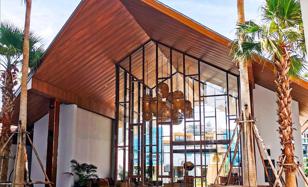Types of property ownership in Thailand: freehold and leasehold

Freehold in Thailand is the equivalent of the perpetual ownership of property, which exists in most countries.
Leasehold is a long-term right of possession, which is registered by the state. Formally, leasehold is a long-term lease, in which the up-front payment is made immediately for the entire ownership period of 90 years.
In a classic leasehold contract, the property is leased for a period of 30 years; this period is guaranteed by the state. The extension for the remaining two terms of 30 years each is guaranteed by the developer (land owner) in his contract. Unless the terms of exclusive ownership are specifically stated in the leasehold contract, the lease is inherited in the normal way. It can also be resold, donated and inherited for the rest of the contract period.
It is better to indicate the heirs in the contract immediately, at the time of signing the contract. Changing the contract afterwards will cost 50,000–100,000 Thai baht (1,400–2,800 US dollars) for legal services.
Both freehold and leasehold types of ownership are registered with the Land Department of Thailand. The owner, who initially leased the property, is not entitled to dispose of it during the entire term of the leasehold contract. This includes the ability to sell or pawn the property, lease it to third parties and make other transactions without the leaseholder’s participation. In addition, the owner is obliged to make a deal with any other person indicated by the leaseholder during the transfer of rights of possession.
Quotas for foreigners in Thailand
There is a freehold quota for foreigners in Thailand. The area of the property on the plot of land is divided: 49% of the property area is sold with the right of ownership (freehold), and 51% — with the right of possession (leasehold).
With the owner’s consent and the availability of a free quota for foreigners in the building, real estate purchased on leasehold can eventually be transferred to the freehold ownership with an additional payment. The amount of this payment is agreed upon individually. Usually freehold properties are 5–10% more expensive.
Foreign individuals cannot register land plots in freehold ownership. On the other hand, Thai companies with foreign founders can register land plots in freehold. However, at least 51% of the share of such a company must be owned by a Thai citizen.
Distinctive features of owning apartments, condos and villas in Thailand
Condominiums and apartment buildings have different rules for registration and ownership.
Apartments (condos) in condominiums have separate cadastral numbers and can be registered to different owners both as freehold and leasehold properties. At the same time, only 49% of the condominium area can be owned by foreigners on a freehold basis, the remaining 51% can be owned only on a leasehold basis by a foreigner.
Apartments in apartment buildings do not have separate cadastral numbers. A building with apartments can have only one owner, and the apartments themselves can be transferred to leasehold ownership.
Since land plots in Thailand cannot be owned by foreign individuals, only the apartment itself and the share of common facilities (swimming pools, gyms, etc.) are transferred into ownership. All residents can use common facilities on equal terms, regardless of the form of ownership, be it leasehold or freehold.
Villas are usually owned by foreigners under two contracts: the building is a freehold property, while the plot of land is in leasehold. It is also possible to register land as a freehold, but only through a legal entity of a resident of the Kingdom of Thailand.
Leasehold or freehold: the pros and cons
Foreigners who buy real estate for investment purposes prefer the leasehold type of ownership. Leasehold real estate is 5–10 percent cheaper; in addition, the leaseholder saves on transaction registration and taxes.
Pros of freehold and leasehold:
Freehold | Leasehold |
|---|---|
Unlimited property management | Property is not declared and is not subject to municipal annual tax |
No need to renew the contract every 30 years | Property price is lower by 5–10% |
No need to keep in touch with the owner | No transfer fee |
Cons of freehold and leasehold:
Freehold | Leasehold |
|---|---|
Property is declared and subject to property tax | Limited ownership |
2% property transfer fee | To sell or to renew the contract once every 30 years, it is necessary to keep in touch with the owner |
Property price is higher by 5–10% |
Freehold and leasehold taxes:
Freehold | Leasehold |
|---|---|
Property transfer fee — 2% | Lease registration fee — 1% |
Stamp duty — 0.5% | Stamp duty — 0.1% |
Annual municipal property tax — from 0.02% to 0.1% depending on the property value and number of registered residents | |
Withholding tax (income tax on sale) — from 1% to 35% depending on the value and tax status of the owner |
You can read more about property taxes in Thailand in our article.
We will send you a content digest not more than once a week























